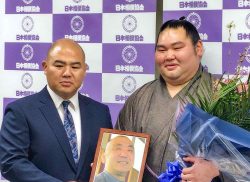17:48 JST, February 28, 2021
It will soon be 10 years since the Great East Japan Earthquake, which left about 22,000 people dead or missing. The central and local governments must support the revitalization of local communities and help disaster victims to live independently.
In the tsunami-hit prefectures of Iwate, Miyagi and Fukushima, the last set of public housing was completed late last year, bringing the total number of units to about 30,000. The preparation of housing lots has also been completed, and temporary housing will be cleared away in Iwate and Miyagi prefectures.
Survivors are beginning to build a new life. It is hoped that the people who suffered harm as a result of the disaster can live with forward-looking minds.
The population is graying in the disaster-stricken areas. Those aged 65 or older account for 40% of the residents in public housing for disaster victims, and many of them live alone or are elderly couples. Some people are said to tend to withdraw from society after they leave the temporary housing and move to a place where they have few acquaintances.
The coronavirus pandemic has made it difficult to hold events to bring public housing residents together. Local governments should work hard to secure opportunities for exchanges, so residents can adapt to their communities.
Morioka has public housing for disaster victims in which the city has stationed five life support counselors to watch over residents and provide counseling. Administrative bodies should expand such efforts in cooperation with nonprofit organizations and social welfare councils.
In addition to the graying of the population, disaster-stricken areas are also facing the problem of a shrinking number of residents.
In the city of Rikuzentakata, Iwate Prefecture, large-scale land elevation work has been completed to develop an urban area 10 meters above sea level, but 60% of the land remains vacant due partly to delays in construction. The city’s population, which was about 24,000 before the disaster, has fallen by more than 20% in the past 10 years.
In Fukushima Prefecture, where a nuclear accident occurred at Tokyo Electric Power Company Holdings Inc.’s Fukushima No. 1 nuclear plant, former residents still cannot return to certain areas. Even in areas where evacuation orders have been lifted, the return of residents has not progressed, for reasons such as the fact that medical and nursing care facilities and commercial facilities have not been restored.
Many residents have already decided not to return to their hometowns because they have been living in the places to which they evacuated for a long time. In light of this reality, the central and local governments need to draw up a long-term vision of how they will shape local communities.
Reconstruction in disaster-stricken areas varies greatly from region to region. From now on, it will be important to provide detailed assistance tailored to the circumstances of individual residents.
The emotional scars of the people who lost their families and other loved ones are still deep.
The mental health care centers set up in the three prefectures by the central government receive a total of about 20,000 consultations every year. In some cases, children talk about insomnia or their refusal to go to school. There needs to be a commitment to securing human resources who can help these disaster victims for a long time.
— The original Japanese article appeared in The Yomiuri Shimbun on Feb. 28, 2021.
Top Articles in Editorial & Columns
-

Riku-Ryu Pair Wins Gold Medal: Their Strong Bond Leads to Major Comeback Victory
-

Reciprocal Tariffs Ruled Illegal: Judiciary Would Not Tolerate President’s High-Handed Approach
-

China Provoked Takaichi into Risky Move of Dissolving House of Representatives, But It’s a Gamble She Just Might Win
-

Japan’s Plan for Investment in U.S.: Aim for Mutual Development by Ensuring Profitability
-

Flu Cases Surging Again: Infection Can Also Be Prevented by Humidifying Indoor Spaces
JN ACCESS RANKING
-

Producer Behind Pop Group XG Arrested for Cocaine Possession
-

Japan PM Takaichi’s Cabinet Resigns en Masse
-

Man Infected with Measles Reportedly Dined at Restaurant in Tokyo Station
-

Israeli Ambassador to Japan Speaks about Japan’s Role in the Reconstruction of Gaza
-

Videos Plagiarized, Reposted with False Subtitles Claiming ‘Ryukyu Belongs to China’; Anti-China False Information Also Posted in Japan
























